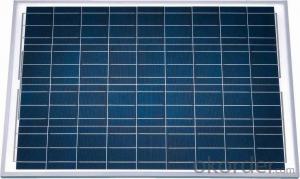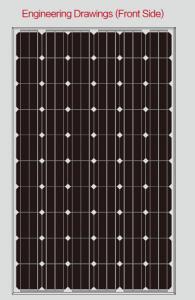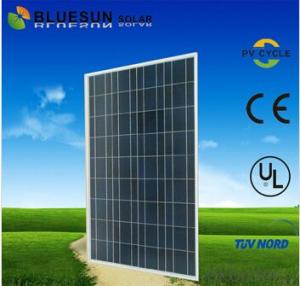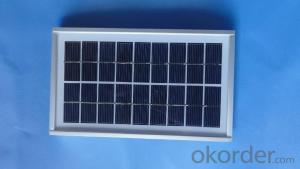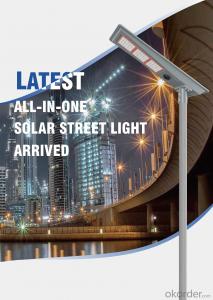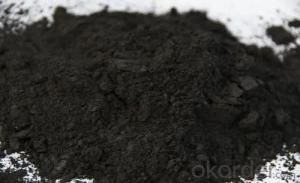CE and TUV Approved High Efficiency 150W Poly Solar Panel
- Loading Port:
- Shanghai
- Payment Terms:
- TT OR LC
- Min Order Qty:
- 10000 watt
- Supply Capability:
- 20000000 watt/month
OKorder Service Pledge
OKorder Financial Service
You Might Also Like
Item specifice
Product Description:
1.Structure of Polycrystalline Silicon Solar Panel
I. High efficiency crystalline silicon solar cell. Even if under the weak light, the solar module can produce maximum power output.
II. Tempered glass (toughened glass): Anti-reflecting coating and high transmission rate glass increase the power output and mechanical strength of solar module.
III. EVA and TPT: Using high quality EVA and TPT to prevent destroying and water.
IV. AI frame: Without screw, rner connection. 6 holes on the frame can be installed easily.
V. Junction box: Multi function junction box with water proof.
VI. Long lifetime: ≥25 years; Less power decrease.
VII. Good performance of preventing from atrocious weather such as wind and hails.
VIII. Resisting moisture and etching effectively, not effected by geology.
IX. The certificate issued by international authority: UL, TUV, IEC, CE.
2.Characteristics
1)Manufactured according to international quality and Environment Management
System (ISO9001, ISO14001)
2)High efficiency crystalline silicon solar cells
3)High transmission Iow iron tempered glass, strong mechanical resistance
4)Anti-ageing EVA and excellent anti-climate back sheet
5)Anodized aluminum frame improves load resistance capabilities for heavy wind loads.
6)Standard waterproof junction box
7)High endurance to different weather
8)Good and friendly package with less transportation and storage space.
3.Warranty
1)10 years limited manufacturing warranty
2)10 years for 90% of warranted minimum power
3)25 years for 80% of warranted minimum power
4.The Pictures of Solar Panels
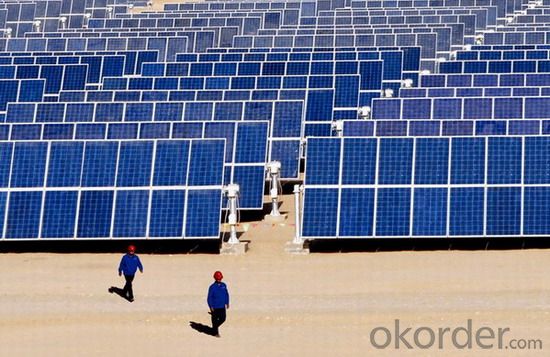
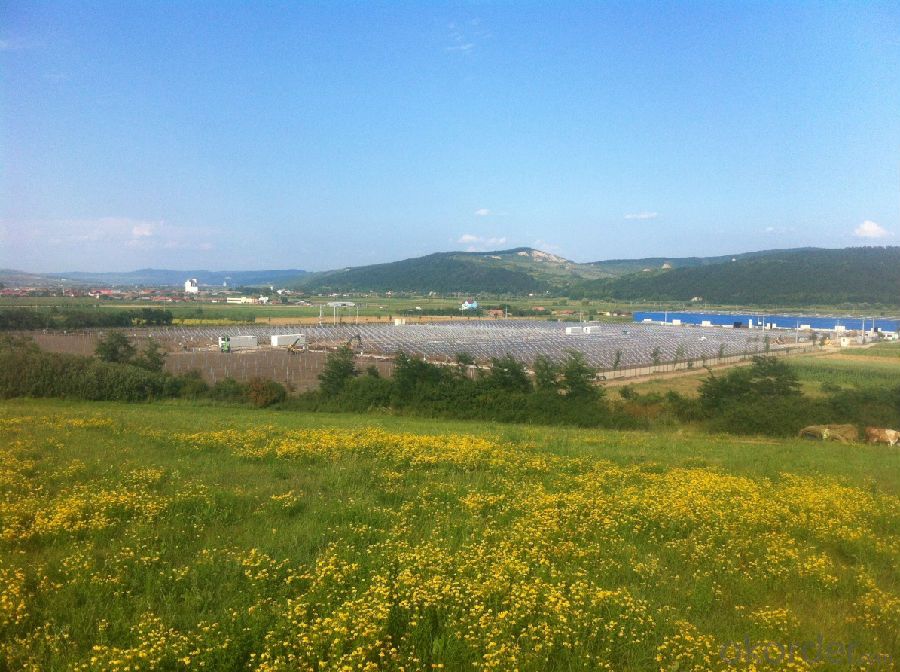
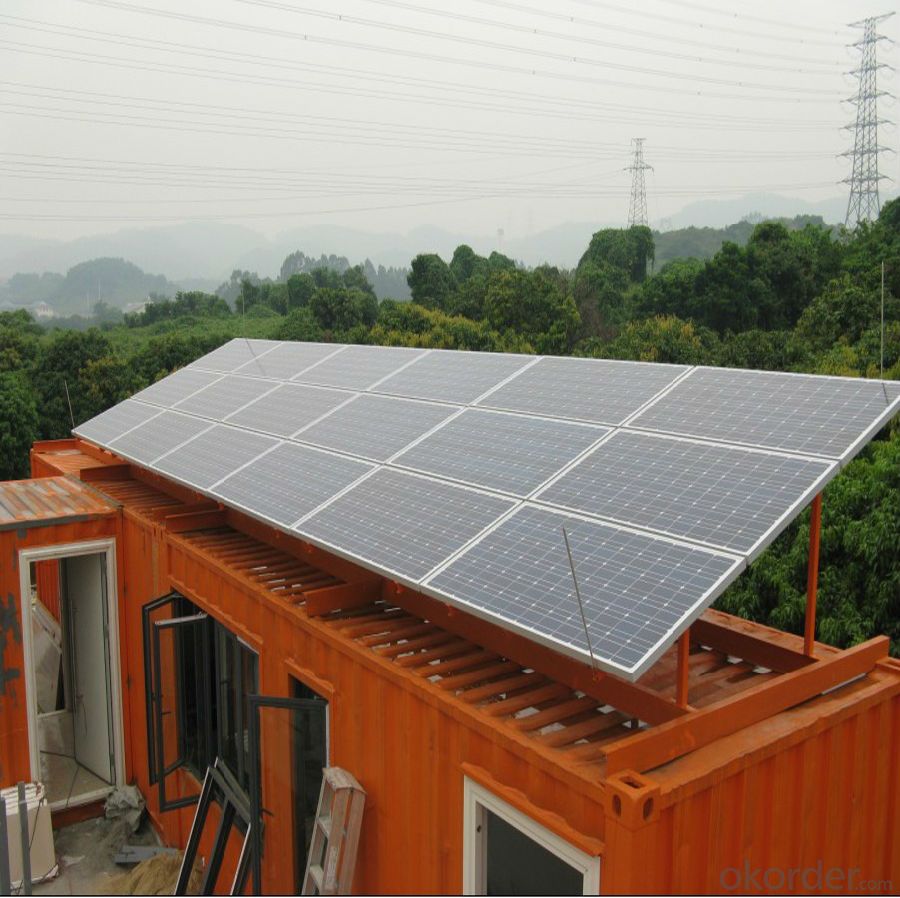
5. Production Flow
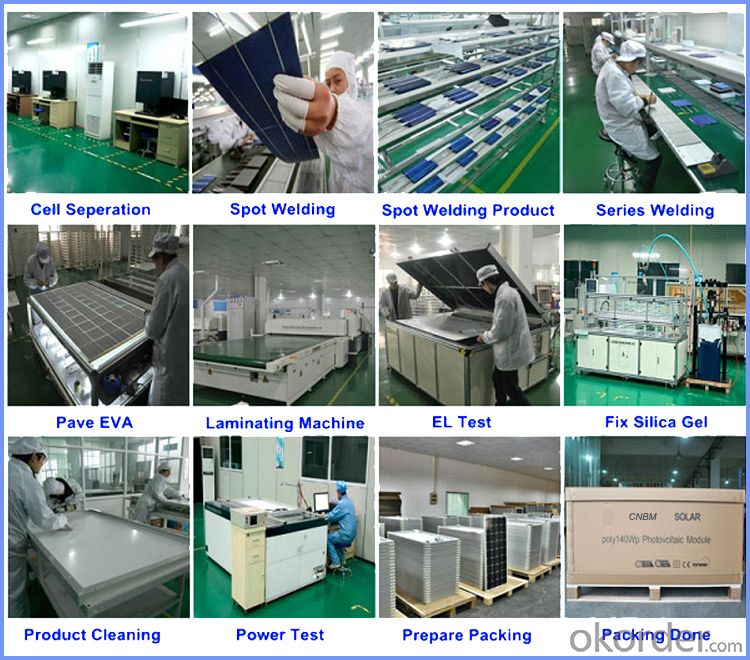
6. Packing Details
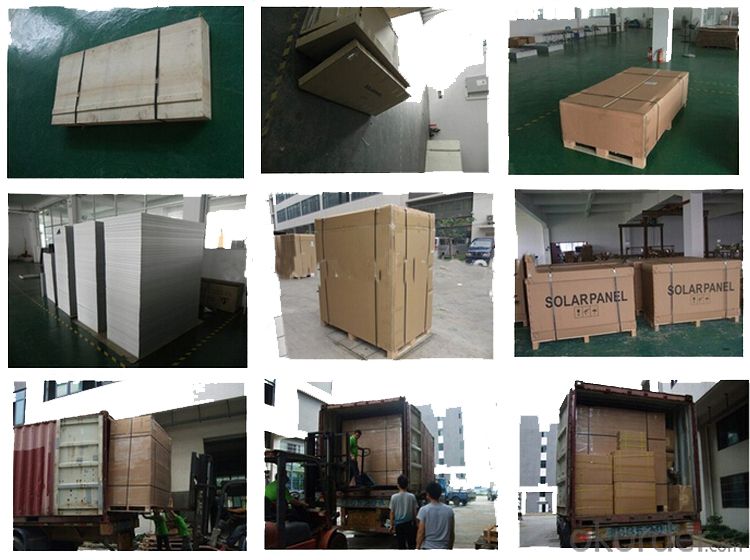
7. Use For
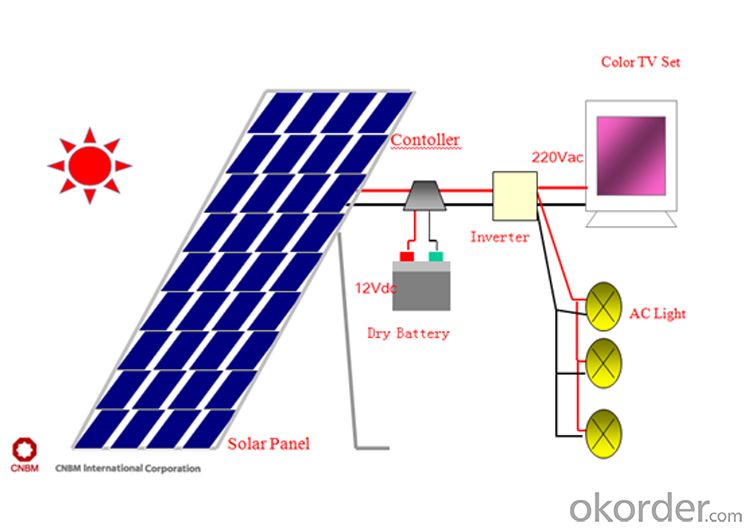
- Q:Can solar panels be used for powering remote monitoring systems?
- Yes, solar panels can be used to power remote monitoring systems. Solar panels capture sunlight and convert it into electricity, which can then be used to power various devices and systems, including remote monitoring systems. This makes solar panels an environmentally friendly and cost-effective solution for powering such systems in remote locations where access to the electrical grid may be limited or non-existent.
- Q:what is a solar panel?
- The term solar panel is best applied to a flat solar thermal collector, such as a solar hot water or air panel used to heat water, air, or otherwise collect solar thermal energy. But 'solar panel' may also refer to a photovoltaic module which is an assembly of solar cells used to generate electricity. In all cases, the panels are typically flat, and are available in various heights and widths. An array is an assembly of solar-thermal panels or photovoltaic (PV) modules; the panels can be connected either in parallel or series depending upon the design objective. Solar panels typically find use in residential, commercial, institutional, and light industrial applications. Solar-thermal panels saw widespread use in Florida and California until the 920's when tank-type water heaters replaced them. A thriving manufacturing business died seemingly overnight. However, solar-thermal panels are still in production, and are common in portions of the world where energy costs, and solar energy availability, are high. Recently there has been a surge toward large scale production of PV modules. In parts of the world with significantly high insolation levels, PV output and their economics are enhanced. PV modules are the primary component of most small-scale solar-electric power generating facilities. Larger facilities, such as solar power plants typically contain an array of reflectors (concentrators), a receiver, and a thermodynamic power cycle, and thus use solar-thermal rather than PV. You could get more information from the link below...
- Q:What is the difference b/w them which one is better .
- how much does these pannels way and which are the most efficient?
- Q:What is the principle of solar panels to convert solar energy into electricity?
- When the light is irradiated on the surface of the solar cell, a part of the photon is absorbed by the silicon material; the energy of the photon is transferred to the silicon atom, so that the electrons are moved and the free electrons are formed on both sides of the P-N junction to form a potential difference. When the circuit is used, the current will flow through the external circuit to produce a certain output power. The essence of this process is the process of converting the energy of the photon into electrical energy.
- Q:And I'm tring to decide if I should buy it. Let's say my house would need Megawatt per hour. That's 000 megawatts per hour. This solar panel produces 36 watts. I don't know how if that means per hour or what???
- Well, a 5 Watt solar panel running for an average of 2 hours per day, (there will be clouds), will put 5 * 2 = 80 Watt-hours into the battery. Assuming your inverter, (to convert 2 Volts D.C. to 20 Volts A.C.) runs at 00% efficiency, that will only supply power to run the grill for about 22 minutes a day. In the real world, neither the battery nor the inverter will work at 00%, to your actual heating time will be significantly less. If you get about 0 more of those 5 Watt solar panels, that would give you about 50 Watts * 2 hours or about 800 Watt-hours which would more than cover what you want to do. The next problem is getting an inverter which will handle a 700 Watt load. They can be found at auto supply houses and the larger truck stops. (They are popular with semi-drivers.) Note however, that a standard car battery will have to supply about 55 Amps, which means you will have to use some really heavy wire, like # 4 or # 6 welding cables to connect the inverter to the battery to minimize losses. P = 700 Watts E = 3 Volts I = 53.84 Amps R =
- Q:Do solar panels require a specific type of wiring or electrical setup?
- Yes, solar panels typically require a specific type of wiring and electrical setup. They need to be connected to an inverter, which converts the direct current (DC) generated by the panels into alternating current (AC) that can be used in homes or fed back into the grid. Additionally, solar panels usually require specific wiring configurations to ensure proper grounding, protection against overcurrent, and compliance with local electrical codes and regulations.
- Q:Can solar panels be damaged by hail or strong winds?
- Yes, solar panels can be damaged by hail or strong winds. Hailstones can cause cracks or fractures in the glass surface of the panels, affecting their efficiency. Additionally, strong winds can potentially dislodge or break the panels if they are not properly installed or secured.
- Q:Can solar panels be installed on a concert venue or entertainment facility?
- Yes, solar panels can be installed on a concert venue or entertainment facility. In fact, many venues are increasingly adopting solar energy as a sustainable and cost-effective solution. Solar panels can be installed on rooftops, parking lots, or open spaces around the venue to generate clean and renewable electricity. This not only helps to reduce the environmental impact but also saves on energy costs in the long run.
- Q:Can solar panels be used in areas with high levels of dust?
- Yes, solar panels can be used in areas with high levels of dust. However, it is important to note that the efficiency of solar panels may be affected by the accumulation of dust on their surface. Regular cleaning and maintenance can help mitigate any potential decrease in performance caused by dust build-up.
- Q:all i want to do is provide enough electricity for 2 fluorescent bulbs i was looking at some 80 watt panels how many of those would i need and what else do i need for storing the electricity for use at nite? and how much would it all cost?
- The solar panels are made in China because there are fewer environmental regulations and cheap coal power. It takes a lot of energy to melt silicon and there are toxic waste products. It would be three to five times more expensive to make the panels in the US ( three times is just for reprocessing the toxic wastes ). Solar cell made in China are about $2 a watt, perhaps as low as $ a watt but in truth the claims for $ a watt or less solar panels as in thin film solar panels have much lower efficiency and require perhaps ten times more surface area.
1. Manufacturer Overview |
|
|---|---|
| Location | |
| Year Established | |
| Annual Output Value | |
| Main Markets | |
| Company Certifications | |
2. Manufacturer Certificates |
|
|---|---|
| a) Certification Name | |
| Range | |
| Reference | |
| Validity Period | |
3. Manufacturer Capability |
|
|---|---|
| a)Trade Capacity | |
| Nearest Port | |
| Export Percentage | |
| No.of Employees in Trade Department | |
| Language Spoken: | |
| b)Factory Information | |
| Factory Size: | |
| No. of Production Lines | |
| Contract Manufacturing | |
| Product Price Range | |
Send your message to us
CE and TUV Approved High Efficiency 150W Poly Solar Panel
- Loading Port:
- Shanghai
- Payment Terms:
- TT OR LC
- Min Order Qty:
- 10000 watt
- Supply Capability:
- 20000000 watt/month
OKorder Service Pledge
OKorder Financial Service
Similar products
New products
Hot products
